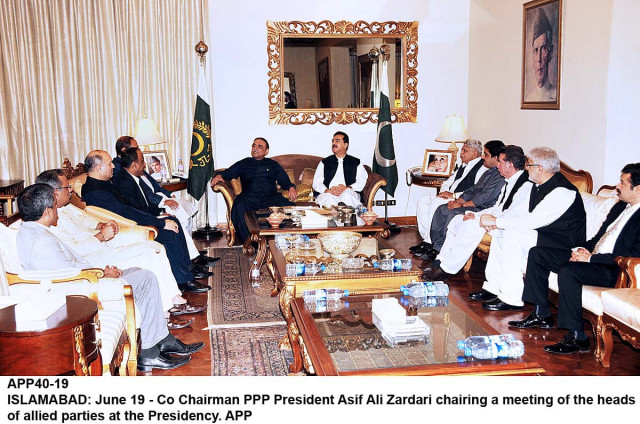Accepting verdict, PPP begins hunt for new PM
Shahabuddin reportedly frontrunner; key party meeting today.

Accepting verdict, PPP begins hunt for new PM
Surprisingly, confrontation does not seem to be the option the embattled government has opted for. It has opted, instead, for pragmatic planning after two emergency meetings – first of the ruling Pakistan Peoples Party (PPP)’s Central Executive Committee and then of the leaders of coalition partners.
Hours after the country’s top court rendered the longest-serving elected prime minister of Pakistan disqualified, it was finally decided to elect a new prime minister to replace Yousaf Raza Gilani. Consequently, a crucial National Assembly session for the vote is expected within the next couple of days.
While speculation is rife, no official confirmation has come on the candidate. Leaders of coalition partners empowered President Asif Ali Zardari to nominate anyone from his party to become the next premier and assured him of their full support for the elections, likely to take place on Thursday.
Top leaders from the allied parties decided not to go into confrontation with the judiciary and the verdict was accepted despite private reservations on it. Gilani, after being apprised by the legal team, refused to go for an intra-court review of the decision – and a presidential pardon for Gilani was also decided against.
The new PM
A participant of the high-level huddle told The Express Tribune that some names were discussed at the meeting but the final decision would be taken at the parliamentary party meeting of the ruling party when it meets today (Wednesday evening).
According to media reports, during the day, some stalwarts from PPP were being considered as replacement for Gilani. The most probable among them was Makhdoom Shahabuddin, a party leader from southern Punjab.
South Punjab, or the Seraiki belt, is the region the PPP is targeting for the upcoming general election — making the candidature of Shahabuddin stronger and giving him an edge over other contenders. An insider told The Express Tribune that Shahabuddin’s name had been finalised and none of the government allied groups raised any objections to it.
Water and Power Minister Chaudhry Ahmed Mukhtar was the other candidate to be the next prime minister for the remaining nine months of the PPP’s tenure, scheduled to end by March next year. Mukhtar was a strong candidate for the premiership after the PPP won the general election back in 2008, but could not make it to the top slot. Hailing from Gujrat district of central Punjab, Mukhtar is considered to be an arch-rival of the leadership of Pakistan Muslim League-Quaid (PML-Q) — the largest of PPP’s allied group. He won against PML-Q chief Chaudhry Shujaat Hussain in 2008 in one of the most closely-fought contests.
Religious Affairs Minister Khursheed Shah, a PPP diehard from its stronghold of Sindh, was also in the limelight for the top slot — with some officials claiming that he was being backed by a majority of the party. But the problem with Shah’s selection is that the PPP can not afford to give all the important slots to the same province.
Some media reports suggested the PML-Q was lobbying for former Punjab chief minister Chaudhry Pervaiz Elahi. But a participant stated that, neither was his name considered, nor did the party push for it.
No early elections
According to insiders present at the meeting, the president had ruled out any possibility of calling for fresh parliamentary polls at any cost, saying he would not bow down to the forces out to derail the democratic system.
“I know democracy is under threat from all sides but [no one can] force us to hold early elections. I will not run from the battleground,” an insider quoted Zardari as telling the leaders of allied parties.
“Over my dead body... As long as I live, nobody can force us to dissolve the government even a day ahead of our term,” Zardari said in a defiant tone, insinuating that his party members should be well prepared for a long political and legal battle.
CEC meeting
Earlier in the day, the president held emergency talks with central leaders of the PPP.
“Though we have reservations about this judgment, we will take advice from the allied parties and legal experts and will then chalk out a strategy for the future,” Information Minister Qamar Zaman Kaira told reporters after the meeting.
“The Central Executive Committee has advised all party workers to remain calm and show patience and not to protest against the verdict,” he added. Asked whether the PPP was considering a presidential pardon for Gilani, the information minister said “no such suggestion is under consideration”.
PPP Secretary General Jehangir Badar said the party’s executive committee had given Zardari “complete authority... to take any decision after taking advice from the allied parties”.
(Read: A judicial coup?)
Published In The Express Tribune, June 20th, 2012.



















COMMENTS
Comments are moderated and generally will be posted if they are on-topic and not abusive.
For more information, please see our Comments FAQ